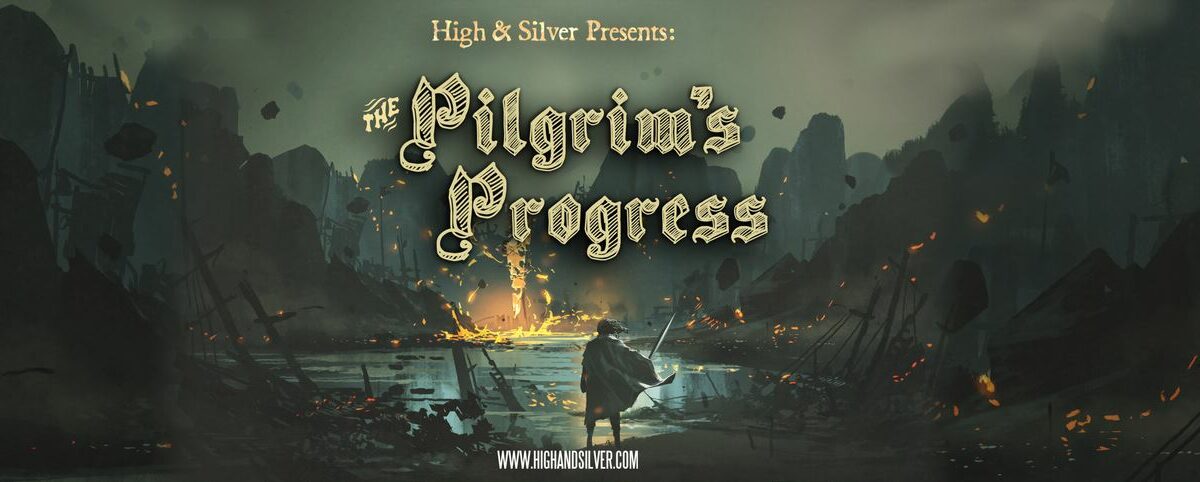104. What If You Fled From God’s Wrath Into Puritan Allegory? | The Pilgrim’s Progress with Zachary Bartels
Podcast: Play in new window | Download (Duration: 1:33:05 — 86.6MB) | Embed
This is a special book. It was a book many of our forefathers used to read to us, and now we’re going to explore it with you. Has it got any sports in it? Fencing, fighting, torture, revenge, giants, monsters, chases, escapes, true love, miracles! Ah yes, and Christian allegory—infamous and misunderstood Christian allegory. Yet it’s well worth rediscovering especially in our age of dramatic long-form listening. Welcome back to Pilgrim’s Progress, as adapted for a new serialized fiction podcast in all its gospel-allegorical glory, by today’s guest on Fantastical Truth.
Subscribe to Lorehaven
articles • news • library • reviews • podcast • gifts • guild
Episode sponsors
- The Testimony Podcast from Andrew Chamberlain
- Lorehaven Guild: April’s new Book Quest for S. D. Smith’s The Green Ember
- See all podcast sponsors
Introducing guest Zachary Bartels
An award-winning preacher and Bible teacher, Zachary Bartels has served as pastor of Judson Baptist Church since 2005. He holds degrees from Cornerstone University and Grand Rapids Theological Seminary. His debut novel, Playing Saint, was called an “intrigue-filled thriller” (Library Journal) and “a page-turner from the very beginning . . . gripping and realistic” (RT Book Reviews) and was a finalist for the Inspys and Carol Awards. His followup, The Last Con (HarperCollins Christian Fiction) “will leave readers stunned” (RT Book Reviews). More recently, he has released Playing Saint: All Souls Day (the sequel to Playing Saint) and Clinch: A Novel, which is geared toward young adult audiences. The audiobooks of Zachary’s novels are full of cinematic music and sound effects and are available in various bundles on his website. Zachary lives with his wife and son in the capital city of a mitten-shaped state, where he enjoys film, fine cigars, stimulating conversation, gourmet coffee, reading, writing, and cycling. He also co-hosts The Gut Check Podcast and High and Silver Presents: The Pilgrim’s Progress.
Assorted quotes and notes
- Gut Check Press homepage
- “What’s Wrong With a Little ‘Ha Ha’?,” Ted Kluck, Speculative Faith
- “Making Sport of End-Times Thrillers, with Ted Kluck,” Speculative Faith
1. How did you find faith, fantastical fiction, and Pilgrim’s Progress?
- Zachary Bartels’s personal origin story, pastoral calling, challenging fiction.
- His own discovery of Pilgrim’s Progress, including any early beliefs about it.
- We myth-bust the label of “Puritan” and the story’s historical context.
2. What’s the legacy of Pilgrim’s Progress and its famous allegories?
- Con: some Christians believe allegory is the most spiritual kind of fantasy.
- Pro: earnest and simple allegories can truly help reflect gospel truth.
- Neutral: This story shows a lot of gray areas, such as a Moses-law figure!
3. What’s great and challenging about adapting this for audio drama?
- Integrating flashback stories (Christiana, Faithful) into the main narrative.
- Modernizing dialogue, with very occasional moments of self-awareness.
- Open discussion and updates about upcoming episodes.
Next on Fantastical Truth
What if you were an ambulance-chasing lawyer, desperate for relevance and cash? Then aliens hired you to represent them before the United Nations. They want to heal every human disease in exchange for 30 percent of Earth’s gold. This turns you into the target for not only big pharmaceutical companies, but the aliens themselves. That’s the world of Maxine Justice: Galactic Attorney, landing on Earthling shelves next week, and sci-fi writer Daniel Schwabauer joins us to explore these new ETs who don’t attack militaries, but big business!



































What’s that joke about a group of white guys is called a podcast? I feel like this is an extension of that joke where of course the way a bunch of white guys want to introduce Pilgrim’s Progress to a new generation is by way of a podcast.
But I am disappoint because you guys barely dipped your toes in the historical context. You’re not gonna mention anyone else under the Dissenting umbrella besides Puritans and Baptists, like the Quakers or the Diggers (who are hands-down more interesting)? Foxe’s Book of Martyrs? Where Milton’s Paradise Lost fits into the timeline and the larger context? Are you even allowed to complain about Kids These Days and Their Short Attention Spans and Lack of Appreciation for Depth if you can’t even bother to incorporate the variety of Dissenter thought into your understanding of the work? 😛
Honestly, between Calvin and stripping out all the fun parts of Catholicism, Puritans pretty much deserve their reputation for dourness. About the only thing they had going for ’em was not enforcing marital abstention during Lent and suchlike — mostly because they abolished Lent and suchlike. Doesn’t make up for abolishing the 12 days of Christmas. >:(
PS: “Vanity Fair” is also the name of a later Victorian novel that is Literarily Important and also an critique of contemporary heroic tropes. Thackeray was very deliberately playing with the idea introduced by Bunyan. IDK the context for the editors of the magazine choosing that name, but it was more likely a reference for the novel rather than the Bunyan symbolism.
“What’s that joke about a group of white guys is called a podcast?”
Notleia, that is not an intelligent point, just a slur. And petty insults like that have no place here. Frankly, you need a new hobby.
So unsubscribe. You seem to be expending a lot of emotional energy on this podcast and Lorehaven in general when there is plenty of content out there that you agree with. I’m puzzled why you continue to consume media you clearly despise. (reposted as a reply)
Notleia, today the members of the Lorehaven Council have spoken unanimously, and we have decided to restrict you from writing further comments at this site.
For several years, I’ve personally tried to be patient with your various blustery outputs. As I mention in our recent podcast episode, I’ve personally felt the sting of spiritual abuse, and have great sympathy for anyone with legitimate Church Back Home trauma. (And I’ve been very clear in this and other episodes / articles about what I mean by “legitimate,” so that your previous barbs are vapid and unjustified.) I also believe in free inquiry and free speech, with the furthest possible limit.
However, you’ve now crossed that limit. Congratulations. Your crossing comes after we have already banned you from the Lorehaven Guild for obnoxious and arrogant violations of the Code of Honor—the first member there so banned. Again, congratulations. There as here, it is long since clear that you keep returning to this site only to heckle its creative team for not obsessing over the exacting topics you want to hear about, particularly your frequent church-lady-like chastisements when we don’t spend a podcast episode following your preferred philosophical rabbit-trails. These reruns have long since lost all rewatchability, and will only lead all parties to increasing frustration.
So we’ve chosen not to do this any more. We invite you to keep following our articles and podcast episodes, should you so choose, but we will no longer enable your participation in the comments section. Of course, you could try to evade any specific name–, email–, or IP-based blocks. But you seem quite determined to draw attention to yourself, so I must doubt you could evade well without giving yourself away within a single comment. 🙂 However, if you were to limit your comments to the more creative, positive, and actually interesting engagement that can only help you grow and can only help actually challenge and benefit this august Council, well, wouldn’t this be the very approach I’ve always been longing that you would demonstrate? Either way, we feel it’s best for you to engage the real-life Christians in your life (you do know some of them, yes?) rather than unhealthily futzing about at this web zone of Lorehaven dot com or its various portals. We wish you Godspeed.
I went to a small Christian school during elementary and a children’s reader version of Pilgrim’s Progress was one of the things they assigned. It was pretty good, so I’ll have to check out Zachary Bartel’s podcast and find the more original version of Pilgrim’s Progress to read.
Hinds’ Feet On High Places has a similar feel in terms of their naming conventions and the fact that it discusses the Christian journey, so you guys might check that out if you haven’t already. There was a simplified version of it that was assigned to my class during fourth grade and it was pretty interesting.
In a way I’ve gone through the wavering attention span thing a little bit as well, and I’ve been trying to fix it slowly but surely. There were a lot of causes that led up to the attention span problem, such as the fact that, a few years ago, I just wasn’t finding a whole lot of novels that I enjoyed, so I took a break from reading them. As the years went on, I’ve gotten busy with life and personal projects, as well as some burnout from societal craziness.
My attention span isn’t horrible. I still listen to long podcasts and whatnot, but there’s a lot of other areas where I’ve noticed that I’m doing worse than I did when I was a kid. After analyzing the problem, I’ve been slowly fixing it by finding actual novels that I know I will enjoy and making sure I take time out to read them. What I’ve had to realize is that it’s not that I don’t enjoy reading, and it’s not that my attention span has been damaged forever. I’ve just gotten out of the habit of reading and engaging with things the way I used to.
And when it comes to worthwhile things, like reading enjoyable books or working on my projects, I just have to force myself to get started and everything becomes easier from there. After enough times of reading enjoyable books it’ll get much easier to associate novel reading as something I actually want to put effort in. So it’s all about noticing one’s habits and tendencies, taking note of what causes them, implementing strategies to handle the causes, and evaluating and adjusting the strategies if they don’t seem to be working.
I am thinking of when I read Gone with the Wind, and The Pillars of the Earth, those were long reads for me back in the day when I was a wee lass. Over a thousand pages, and I enjoyed them. Perhaps longer fiction or non-fiction is written differently back then than now. Interesting thoughts.
I had an excellent attention span throughout my childhood, and could plow through long books like it was nothing. And then there’s people like the guy you mentioned, who used to read War and Peace every year. So the fact that even adults with good reading and attention skills are starting to decline means that society does have an attention span issue that is worth fixing.
But what does a long attention span actually Mean? Just because it’s convenient for teachers doesn’t mean it can’t also be maladaptive in the long run.
But also part of it is because we’ve had a society-wide Trauma happen to various degrees over the last couple years (also we live in a capitalist hellscape stagnant wages die in the traces blahblah r/antiwork etc).
Jasper Fforde talked about this in one of his Thursday Next books over a decade ago, it talked about the falling attention span, the especially amusing part was it being set in the mid 1980s at that point. It’s been a few years since I read the books, so I don’t remember which one that was in, but it was a big concern as people were reading less and concentrating less. In the book it was blamed on reality shows and game shows.